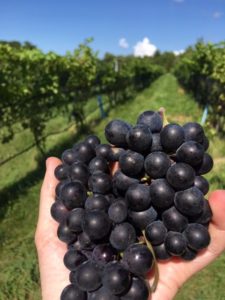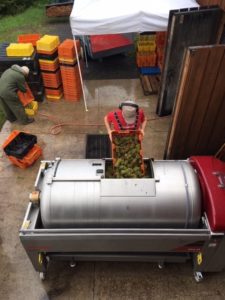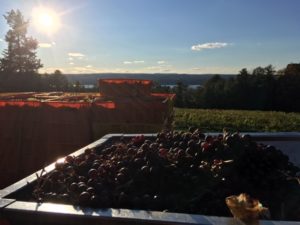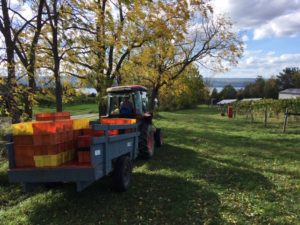2018 Harvest Report
January 3, 2019–We will always remember the 2018 harvest, and probably not in a good way. Many of our colleagues around the Finger Lakes have called it their most difficult harvest ever. Extremely wet conditions, high incidence of rot in the fruit, and slow sugar accumulation meant day after day of stress, monitoring and tedious sorting to get the best and ripest fruit possible. The result? We are very pleased with the quality of the 2018 wine we have in our cellar, but volumes are disappointingly small.

Pinot Noir grapes for making Dry Rose were picked on Sept. 16, 2018, one of the few sunny days we had during harvest.
The vintage seemed off to an excellent start with warm, sunny and dry weather during the first half of the growing season. The potential crop size was smaller than average (due to the cloudy and rainy 2017 season that reduced the productivity of the 2018 buds) but the weather up to that point was promising. By the end of July, the word “drought” was starting to be discussed and we turned on the irrigation to our lakeside vineyard.
In mid-August, the weather took a drastic turn, starting with an epic storm that dumped 9 inches of rain on the town of Lodi on August 14 and caused flash flooding. We went from nearly zero fungal disease pressure to high fungal disease pressure overnight. To make matters more challenging, the rainy pattern continued. We tallied just over 21 inches of rain at our vineyard from August-October 2018, which is more than twice as much as the average for that period.
Luckily, we hand harvest and field sort all of our estate-grown fruit. We were able to make several passes through the more rot-prone varieties (Riesling, Pinot Noir and Gewurztraminer). In this way, we could harvest fruit that was beginning to show damage from rot and leave the rest of the crop to get riper.
A bright spot in this year’s harvest was our 100% Bio-intensively farmed block, which had virtually zero rot problems. The fruit in this section developed thicker skins due to our farming methods that give the vine resources to strengthen itself against disease. We believe the thicker skins helped prevent rot development.
We expect that 2018 will distinguish wine growers who had the tools to adapt to the challenging conditions, and who went the extra mile for quality in the face of adversity. Look for Silver Thread to be among that select group of producers aiming to grow the reputation of our region, even in the most challenging year.





